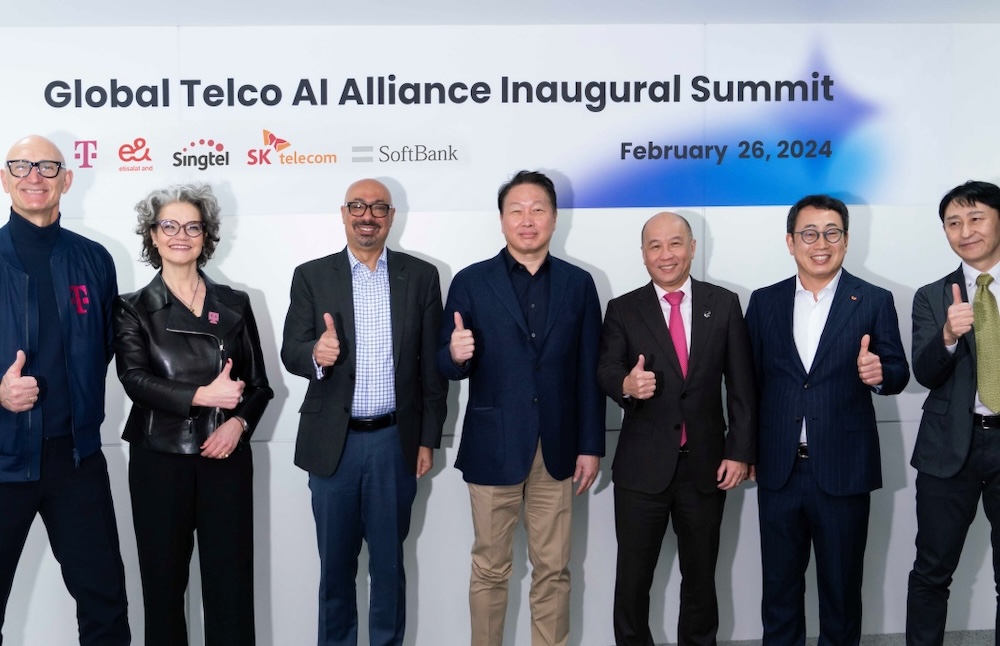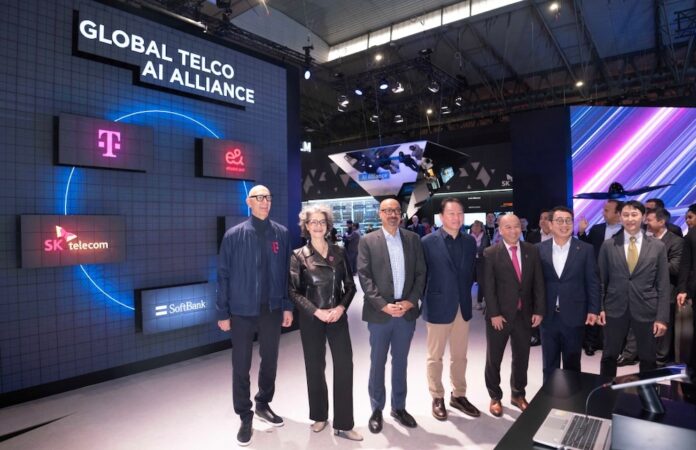SK Telecom, Deutsche Telekom, e&, Singtel, and SoftBank meet up to agree a way forward for their new AI club
South Korea’s SK Telecom (SKT), which has already announced it is transitioning to become an AI company, caught up with its new AI partners Deutsche Telekom, e&, Singtel, and SoftBank in Barcelona to plan the next steps of its Global Telco Alliance, which wants to develop Large Language Models (LLMs) specifically tailored to the needs of telcos.
Last year, SKT announced a $100 million investment in US AI model maker Anthropic to jointly develop a large language model for the telecom industry. And it keeps on investing in AI – even as recently as overnight, SKT announced plans to partner US AI startup Perplexity to offer the AI-based search engine to its users as an alternative to Google.
The Alliance partners agreed to establish a joint venture this year to develop telco-specific Large Language Models (LLM), which should be more fit for purpose – and less energy hungry – than shifting all AI workloads to hyperscalers running generic AI factories.
The meeting was attended by SKT chairman Chey Tae-won and CEO Ryu Young-sang, Deutsche Telekom CEO Tim Höttges and DT board member for technology & innovation, Claudia Nemat, e& Group CEO Hatem Dowidar, Singtel Group CEO Yuen Kuan Moon and SoftBank CISO Tadashi Iida.
The telcos agreed the LLMs will be designed to help telcos improve their customer interactions via digital assistants and chatbots. The goal is to develop a multilingual LLMs optimized for languages including Korean, English, German, Arabic and Japanese, with plans to for other languages like Bahasa Indonesia – a hint to the next telco to join – so that it can be deployed in Southeast Asia. SKT has already expanded its metaverse platform Ifland to Indonesia and has a deal with Axiata which has operations in around a dozen ASEAN and South Asian countries.
The current members have some reach too, pointing out that they already serve approximately 1.3 billion users across 50 countries. A telco-specific LLM model, the members say, will better understand user intent, making it easier and quicker to deploy. The LLMs are already currently being optimised using the telcos’ customer service data to fine-tune the model for telco-specific questions.
What the Alliance members said
Things like tariff and contract models, information on special hardware such as the router, for example (e.g. How do I do a reset?) are rarely found in the general training data of the large models. This targeted training ensures the LLM understands the unique language and needs of telecom operators, paving the way for enhanced, personalised, and efficient customer experiences.

“We as telcos need to develop tailored LLM for the telco industry to make telco operations more efficient, which is a low-hanging fruit. Our ultimate goal is to discover new business models by redefining relationships with customers,” said SKT’s Ryu.
“Already today, more than 100,000 customer service dialogues a month in Germany are handled by Generative AI,” said DT’s Nemat. “By integrating telco-specific large language models, our ‘Frag Magenta’ chatbot becomes even more human-centric: AI personalises conversations between customers and chatbots.
“From streamlining customer support interactions to enabling personalised recommendations, this multi-lingual LLM will revolutionise how businesses engage with customers”, said e& Group chief AI and data officer Dena Almansoori. “In collaboration with our Global AI Telco Alliance partners, we look forward to shaping both the present and future of customer engagement and setting new standards for efficiency and innovation across the telecommunications landscape to better serve our customers and create meaningful impact.”
“This promises to be a game changer not just for us at Singtel but for any telecom company out there looking to lift their customer experience beyond limited automated responses and generic chatbot interactions,” said Singtel’s Yuen. “This multi-lingual LLM tailored for telcos will greatly expand chatbot capabilities with relevant responses to customers’ technical queries, freeing up service agents to deal with more complex customer issues and we intend to deploy this across the Singtel Group.”
“Through a powerful alliance with industry leaders, we embark on a mission to revolutionise global communication, elevate service quality, and ignite a new era of technological innovation powered by AI. Together, we have the power to shape the future of telecommunications, empowering communities worldwide with seamless connectivity and boundless opportunities,” said Softbank EVP and CTO Hideyuki Tsukuda.



